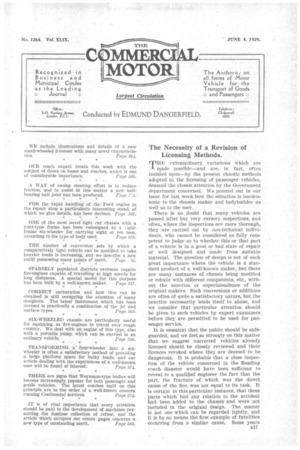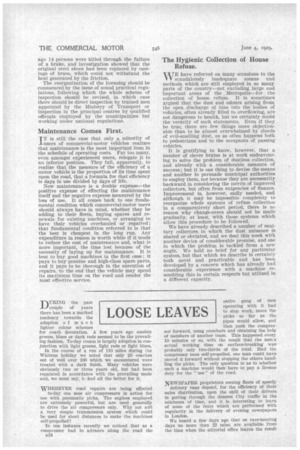The Necessity of a Revision of Licensing Methods.
Page 43

Page 44

If you've noticed an error in this article please click here to report it so we can fix it.
THE extraordinary variations which are made possible—and are, in fact, often insisted upon--by the present chaotic methods adopted in the licensing of passenger vehicles, demand the closest attention by the .Government department concerned. We pointed out in our issue for last week how the situation is burdensome to the chassis maker and bodybuilder as well as to the user.
There is no doubt that many vehicles are passed after but very cursory inspections, and often, where the inspections are more thorough, they are carried out by non-technical individuals, who cannot be considered as fully competent to judge as to whether this or that part of a vehicle is in a good or bad state of repair or well designed and made from suitable material. The question of design is not of such great importance where the vehicle is a standard product of a well-known maker, but there are many instances of chassis being modified or rebuilt with different components, etc., without the sanction or superintendence of the original makers. Such conversions or additions are often of quite a satisfactory nature, but the practice necessarily lends itself to abuse, and we consider that particular attention should be given to such vehicles by expert examiners before they are permitted to be used for passenger service.
• It is essential that the public should be safeguarded, and we feel so strongly on this matter ;that we suggest converted vehicles already licensed should be closely reviewed and their licences revoked where they are deemed to be dangerous. It is probable that a close inspection of the vehicle concerned in the Reading coach disaster would have been sufficient to reveal to a qualified engineer the fact that the• part, the fracture of which was the direct cause of the fire, was not equal to its task. It is certain in this particular instance, that those parts which' had any relation to the accident had been added to the chassis and were not included in the original design. The • matter is not one which can be regarded lightly, and it is by no means the first example of fatalities occurring from a similar cause. Some years
ago 14 persons were killed through the failure of a brake, and investigation showed that the original steel shoes had been replaced by castings of brass, which could not withstand the heat generated by the friction.
The reorganization of the licensing should be commenced by the issue of sound practical regulations, following which the whole scheme of Inspection should be revised, in which case there should be direct inspection by trained men appointed by the Ministry of Transport or inspection in the principal centres by qualified officials employed by the municipalities but working under national regulations.
Maintenance Comes First.
TT is still the ease that only a minority of Xusers of commercial-motor vehicles realizes that maintenance is the most important item in the schedule of operating costs. Far too many, even amongst experienced users, relegate j.t to an inferior position. They fail, apparently, to realize that the measure of the efficiency of a motor vehicle is the proportion of its time spent upon the road, that a formula for that efficiency is days in use divided by days of life.
Now maintenance is a double expense—the positive expense of effecting the maintenance Itself and the negative expense measured by the loss of use. It all comes back to one fundamental condition which commercial-motor users should always have in mind, whether they be adding to their fleets, buying spares and renewals for existing machines, or arranging to have their vehicles overhauled or repaired ; that fundamental condition referred to is that the best is cheapest in the long run. Any expenditure in reason is worth while if it tends to reduce the cost of maintenance and, what is more important, the time lost because of the necessity of laying up for maintenance. It is best to buy good machines in the first ease; it pays to buy genuine and high-class spare parts, and it pays to be thorough in the execution of repairs, to the end that the vehicle may spend its maximum time on the road and render the most effective service.
The Hygienic Collection of House Refuse.
\ATE have referred on many occasions to the scandalously inadequate means and methods which are still employed in so many parts of the country—not excluding large amd important areas of the Metropolis—for the collectionof house refuse. It is sometimes argued that the dust and odours arising from the open discharge of bins into the bodies of vehicles, often already filled to overflowing, are not dangerous to health, but we certainly doubt the veracity of such statements. Even if they be true, there are few things more objectionable than to be almost overwhelmed by clouds of evil-smelling dust, as so often happens both to pedestrians and to the occupants of passing vehicles.
It is gratifying to know, however, that a number of clever brains is at work endeavouring to solve the problem of dustless collection. and already with a considerable measure of success; but it is one thing to devise the means and another to persuade municipal authorities to employ them, not because they are necessarily backward in considering the merits of improved collectors, but often from exigencies of finance. Improvement is, however, sadly needed, and although it may be impossible completely to reorganize whole systems of refuse collection in a comparatively short period, there is no reason why change-overs should not be made gradually, at least, with those systems which allow this procedure to be followed.
We have already described a number of sanitary collectors in which the dust nuisance Is abated or obviated, and we deal this week with another device of considerable promise, and one iu which the problem is tackled from a new angle. We hold no brief for any particular system, but that which we describe is certainly both novel and practicable and has been developed by a concern which has already had considerable experience with a machine resembling this in certain respects but utilized in a different capacity.




















































































































